 |
 |
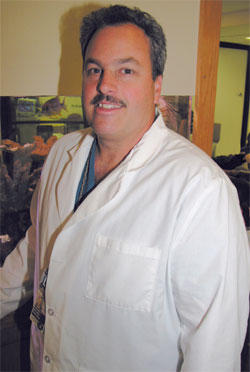
|
|
Dennis Brown, A.S., Registered Respiratory Therapist (RRT), Critical Care Medicine Department, Clinical Center, National Institutes of Health, Bethesda, Maryland
|
1. I chose this career because...
2. Equipment I use on the job...
3. My typical workday involves...
4. What I like best/least about my work...
5. My career goals are...
6. When I'm not working, I like to...
|
|
1. I chose this career because...
|
Back to Top

|
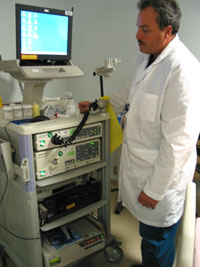
|
|
Dennis Brown using an indirect calorimeter – a device that can provide information to assess the nutritional status of a patient by analyzing exhaled air.
|
I chose to become a respiratory therapist because I was impressed with the college curriculum and the role of the respiratory care professional in the hospital setting. Actually, I could not make up my mind which career to pursue after high school until I attended a career day. After speaking with a respiratory therapy instructor, I was sold. I had always been interested in the medical profession, and the coursework provided me with the flexibility to choose another medical profession if I found respiratory care was not what I believed it to be. Aside from the specific courses related to respiratory care, all the other classes I took could have been easily transferred to a pre-med or nursing program. After completing my education in respiratory care, it was clear that this was the profession for me.
Several of my friends, in a class ahead of me, provided mentorship in the area of respiratory care. They inspired me, by keeping me informed about the job market, and the ever-expanding role of the respiratory care professional. My friends were actually able to work in a respiratory care department while going to school. This allowed them to earn extra money while going to school. Even though they were not able to take care of patients at that time, they were able to work on the equipment routinely used in respiratory care.
My First Job While Finishing My Education
At the start of my college career I was fortunate to be accepted into the stay-in school program at the NIH. I was even more fortunate to be placed into a job related to my career. It is at the NIH that I gained extensive knowledge about putting together and taking apart respiratory equipment. I also performed calibration and function checks on the equipment used on patients. This experience was invaluable.
I completed my respiratory program in two years. During that time, I especially enjoyed the clinical practicum that provided hands on experience and helped me apply the knowledge gained to the clinical environment.
Education
- Currently enrolled in BS/MA Program in Healthcare Administration; California College for Health Sciences, National City, California
- Associate of Science, California College for Health Sciences, National City, California
- Respiratory Therapy Technician Program, California College for Health Sciences, National City, California
- Respiratory Therapist Program, Columbia Union College, Takoma Park, Maryland
Professional Affiliations
- I am a member of the American Association for Respiratory Care (AARC) http://www.aarc.org/, which is the professional society for the respiratory therapist.
- Because my experience is primarily in critical care, I am also a member of the Society for Critical Care Medicine (SCCM) http://www.sccm.org/ .
- I have received advanced credentialing through the National Board for Respiratory Care (NBRC) http://www.nbrc.org/ as a registered respiratory therapist.
Certification and Licensing
Like nursing, the respiratory care practitioner is a licensed healthcare provider and is required to maintain a license in the state where respiratory therapy is practiced. There are two and four year respiratory programs. Through the National Board of Respiratory Care (NBRC) the respiratory therapist must earn credentialing by taking examinations to earn credentialing as a certified respiratory therapist (CRT) or an advanced level practitioner known as a registered respiratory therapist (RRT).
|
|
2. Equipment I use on the job...
|
Back to Top

|

|
|
Dennis Brown introduces blood into an analyzer used to measure different components in the blood, uses the bronchoscopy system to assist in the diagnosis lung problems, and checks a mechanical ventilator that helps patients breath.
|
- Bronchoscopy System – a diagnostic system used to visualize and photograph the inside of a patient’s lungs. From this procedure we can determine the etiology (cause) of breathing problems and provide the patient with the appropriate care.
- Mechanical Ventilator – a life support system that helps the patient breath, or breathes for a patient who is unable to breath on their own.
- Stat Laboratory – a place that maintains devices that analyzes blood from arteries and helps maintain a patient’s critical blood values, like carbon dioxide and oxygen, in the normal ranges.
- Indirect Calorimeter – a device that can provide information to assess the nutritional status of a patient by analyzing exhaled air.
The respiratory therapist is technically skilled and can operate and maintain many different devices. Some of the equipment is used for life support such as mechanical ventilators, bronchoscopy systems, non-invasive ventilators, laboratory blood gas analyzers, high flow and low flow oxygen delivery devices, portable monitoring systems, EKGs, non invasive ventilators, and the list goes on and on.
|
|
3. My typical workday involves...
|
Back to Top

|
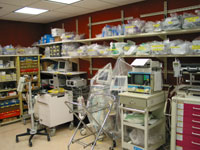
|
|
Dennis Brown takes a regular inventory of supplies and checks equipment for proper functioning.
|
My typical workday in the Critical Care Medicine Department http://www.cc.nih.gov/ccmd/htmlpg/resther.html is divided between my administrative duties and my clinical responsibilities. My actual title at the NIH is a Medical Program Specialist. (Read about a similar career - the Medical and Health Services Manager)
Administrative Responsibilities
- Hold regular meetings with my staff and with the users of our services
- Prepare various reports – workload and productivity of the section, patient census, quality assurance, quality improvement
- Provide mentorship to the staff on the operation of equipment and troubleshooting techniques
- Provide orientation and training to medical staff on various respiratory related concepts
- Evaluate/test/select new clinical equipment used for patient care
Clinical Responsibilities
- Provide respiratory therapy care to patients
- Review quality assurance on respiratory therapy services provided
- Perform inventory of supplies to ensure adequate stock
- Check equipment to ensure full functionality
- Ensure that all special patient care needs have been met
- Ensure proper staffing in all areas of the hospital service units including
the Medical Intensive Care unit, the Surgical Intensive Care unit, the Heart Station,
the Pentamidine Clinic, the Stat Laboratory, and all inpatient and outpatient nursing units.
|
|
4. What I like best/least about my work...
|
Back to Top

|
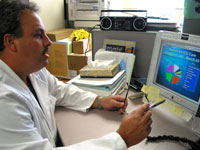
|
|
Dennis Brown reviews data at his desk.
|
What I like best about my job is the diversity of responsibilities and work that is performed. At the Clinical Center we perform lots of diagnostic tests like blood gas analysis, EKG’s, assistance with bronchoscopies and intensive physiological monitoring. We also provide life saving therapies like nebulizer treatments for the management of asthma and pulmonary compromised patients. We support lots of protocols that require our expertise as well. Many people take breathing very much for granted. The patients here are very special.
What I like least about my job is the amount of required daily paperwork. (Hopefully this will be resolved with the new computerized patient data system we anticipate implementing soon.) Healthcare providers that are not willing to go above and beyond the call of duty also frustrates me. The NIH Clinical Center is a special place, with special patients waiting to receive a miracle and be cured of their disease.
|
|
5. My career goals are...
|
Back to Top

|
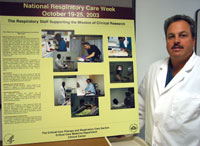
|
|
Dennis Brown coordinates promotion of the National Respiratory Care Week at the NIH. He helped design the poster that shows how the respiratory staff makes important contributions to patient care at the Clinical Center.
|
My career goal is to obtain a masters degree in healthcare management, as my administrative responsibilities have increased.
|
|
6. When I'm not working, I like to...
|
Back to Top

|
|
|
When I am not working I am very involved as an Little League assistant baseball coach working with my two boys who are 6 and 9 years old. I also enjoy singing with the National Christian Choir (http://www.nationalchristianchoir.org/high_spot.html), which is a two hundred voice choir located in the nation's capital. If I have any energy left, I enjoy woodworking and putting together models.
|
|
|
|
 |